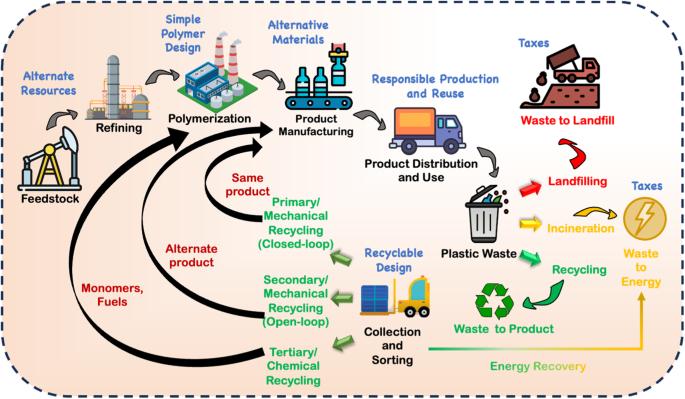Plastic recycling: A panacea or environmental pollution problem
引用次数: 0
Abstract
Increasing plastic waste is a critical global challenge to ecological and human health requiring focused solutions to reduce omnipresent plastic pollution in the environment. While recycling has been touted as one solution to counter plastic waste and resource utilization, it has been largely ineffective in offsetting the impact of rising global plastic production of more than 400 million metric tonnes annually, due to low global recycling rates of only 9%. Over three decades since implementing plastic resin codes, recycling has favoured thermoplastics, neglecting thermoset plastics. There is a constant need to enhance overall recycling efficiency by exploring advanced methods, as enormous gaps exist in fully unlocking the potential of plastic recycling. We identify critical gaps associated with plastic waste recycling and its potential environmental impacts. We discuss substantial progress in recycling technology, designs-for-recyclability with controlled chemical use, and economic incentives to expand markets for recycled plastics and to curb plastic leakage into the environment. Additionally, we highlight some emerging strategies and legally binding international policy instruments, such as the Global Plastics Treaty that require further development to reduce plastic waste and improve plastic recyclability.

塑料回收:灵丹妙药还是环境污染问题
日益增多的塑料废物是生态和人类健康面临的一项严峻的全球性挑战,需要有针对性的解决方案来减少环境中无处不在的塑料污染。尽管回收利用一直被认为是解决塑料废弃物和资源利用问题的方法之一,但由于全球回收利用率仅为 9%,在很大程度上无法有效抵消全球每年 4 亿多公吨塑料产量增长所带来的影响。塑料树脂规范实施 30 多年来,回收利用一直偏重于热塑性塑料,而忽视了热固性塑料。由于在充分释放塑料回收利用潜力方面存在巨大差距,因此始终需要通过探索先进方法来提高整体回收利用效率。我们确定了与塑料废物回收利用及其潜在环境影响相关的关键差距。我们讨论了在回收技术、可控化学品使用的可回收设计、经济激励措施等方面取得的实质性进展,以扩大回收塑料的市场并遏制塑料向环境中的泄漏。此外,我们还强调了一些新兴战略和具有法律约束力的国际政策工具,如《全球塑料条约》,这些战略和工具需要进一步发展,以减少塑料垃圾并提高塑料的可回收性。
本文章由计算机程序翻译,如有差异,请以英文原文为准。
求助全文
约1分钟内获得全文
求助全文

 求助内容:
求助内容: 应助结果提醒方式:
应助结果提醒方式:


